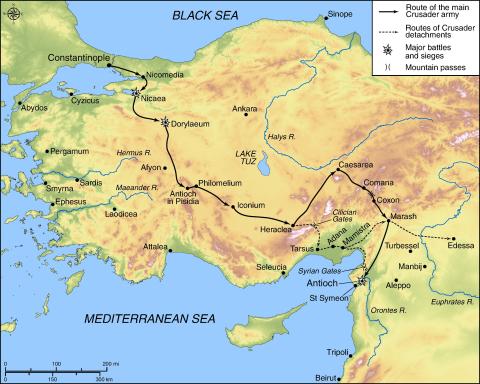Kerbogah Tries to Retake Antioch
[9.27.2] Postquam vērō vēnit obviam imperātōrī ad Philomenam, seorsum vocāvit eum, sēcrētō dīcēns: “Sciās rēvērā quoniam capta est Antiochīa, et castrum minimē captum est; nostrīque omnēs gravī oppressiōne obsessī sunt et, ut putō, ā Turcīs modo interfectī sunt. Revertere ergō retrō quam citius potes, nē et ipsī inveniant tē et hanc gentem quam tēcum dūcis.” Tunc imperātor timōre perterritus, clam vocāvit Widōnem frātrem Boamundī et quosdem aliōs, et ait illīs: “Seniōrēs, quid faciēmus? Ecce omnēs nostrī districtā obsessiōne impedītī sunt, et forsitan in hāc hōrā omnēs ā Turcōrum manibus mortuī sunt, aut in captīvitātem ductī, sīcut iste īnfēlīx comes, turpiter fugiēns, nārrat. Sī vultis, revertāmur retrō celerī cursū, nē et nōs moriāmur repentīnā morte, quemadmodum et illī mortuī sunt.”
notes
(June 1098) Stephen of Blois goes to emperor Alexius, who is leading an army to help the crusaders in Antioch. Stephen says that although the crusaders have indeed taken Antioch, the Turks still hold the citadel and are besieging the city. The crusaders, he says, have probably been killed already. Alexius consults with his leaders and suggests that they should withdraw. One of the men Alexius consults is Guy of Hauteville, Bohemond's half-brother, who was serving as a Byzantine mercenary.
Postquam vērō vēnit: the subject is Stephen of Chartres.
Philomenam: Philomelium, in central Anatolia (modern Akşehir). Alexius was coming to relieve the crusaders besieged in Antioch.
et castrum minimē captum est: CL would be sed castrum minimē captum est.
castrum: “the citadel.”
Widōnem frātrem Boamundī: Guy of Hauteville, Bohemond’s half-brother; he was serving as a Byzantine mercenary.
et quosdem aliōs: other Frankish mercenaries serving the Byzantines.
vocabulary
seorsum: separately
districtus –a –um: severe

